WAR IN THE CONGO
In Pictures
Bambari: A mirror of the crisis in the Central African Republic
A perpetual cycle of violence has led to a catastrophic humanitarian situation for the CAR’s civilian population.In August, 17-year-old Sallet Abdoulay returned from herding cows outside the town when an armed man on a motorbike suddenly stopped and fired shots at him, leaving him bleeding on the floor. A friend later managed to get the young man to the MSF-supported hospital in Bambari, where doctors were able to remove a bullet from his abdomen and stabilise him. But the damage to Sallet’s spine was so severe that MSF had to transfer him by plane to the capital, Bangui, to get specialist treatment.
[Lys Arango/MSF]
5 Oct 2021
Bambari, Central African Republic – Civilians who have been repeatedly forced to flee attacks; health facilities that are regularly targeted; war orphans surviving in the streets and women who are forced to deliver babies in extreme conditions.
The town of Bambari has been hugely marked by the effect of violence that has long plagued the Central African Republic (CAR).
Renewed fighting swept over CAR after a December 2020 presidential election once again brought the country to a breaking point. Clashes between non-state armed groups and government forces backed by foreign troops restarted, leading to the highest level of displacement since 2014. Violence against civilians is widespread, and access for humanitarian organisations has shrunk in many areas, exacerbating the already extreme vulnerability of hundreds of thousands of people.
In the summer of 2021, photojournalist Lys Arango visited the country to document the suffering of ordinary people caught up in the conflict. She accompanied teams from the medical humanitarian organisation Doctors Without Borders (Medecins Sans Frontieres or MSF) in Bambari, CAR’s fourth largest city and one of the areas hit hardest by the latest wave of violence.
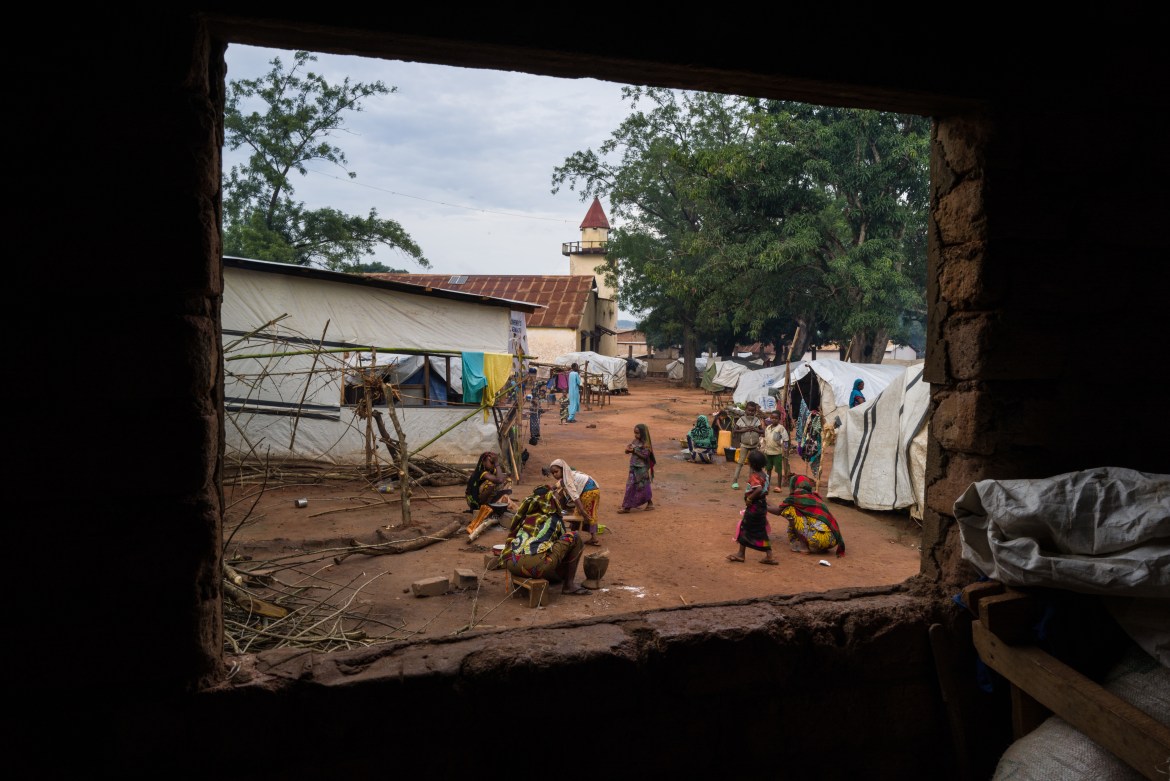
The conflict in CAR has forced more than 1.4 million people of a population of less than five million to flee their homes, while essential health services are extremely limited.
[Lys Arango/MSF]
Amina braids her granddaughter's hair in the compound of the central mosque in Bambari, while her daughter prepares food a few metres away.
[Lys Arango/MSF]
'I am 10 years old and I live in the centre of Bambari with my mother and my little brother, who is five. When my father was killed my mother fell into deep sadness. She spent the day crying, she doesn't do anything else. So, it was my turn to get out and work,' said Iddrisa Adraman. 'I sell a fruit called cola on the street. I walk all day, from seven in the morning until seven in the afternoon. I can earn between 150 CFA ($0.27) up to 1,500 CFA ($2.7) on a good day, like on weekends. The best place to sell is near the bars, where the men drink beer. Until last year I was attending school at the École communautaire de la paix, but it has closed. All the teachers have left Bambari because of the conflict and it makes me sad because I know that if I don't learn I won't be able to become a great man in life. I would like to become a doctor, to be able to heal people. War means blood, means death.'
[Lys Arango/MSF]

Sale Shaoudou: 'I am 12 years old and have seven siblings. One of them is Adamou and we work together on the street selling cola. Our father was a tall and strong man, he was the leader of the Peul [Falani] community, so he was respected by everyone. He worked as a teacher in the Quranic school and I remember that when he lived, we did not lack anything. We ate every day and never went barefoot. The rebels murdered him in Liwa, our town, which is 10km (six miles) from Bambari. They arrived and started shooting. I was with him when a bullet went through his head. I went to his aid and tried to make him wake up, but my mother grabbed my arm and we ran to take refuge in the forest. 'I never saw him again, neither my village. Those men set fire to the houses, even an entire family died charred inside. It was a massacre. Those of us who were able to save ourselves came walking through the forest to Bambari. It took us about 10 or 12 hours. 'We first settled in with a Peul family from Bambari, but they were very poor and did not have enough to feed us all. So my brother Adamou and I went to work and with the money we earn, we support our family. 'I hate this job because we spend the day in the sun. I would also like to study. My dream is to become the president of the Central African Republic, but for that I have to read a lot. If I became president, I would give money to poor people so that they could earn a living from trade and not from arms. 'What is war? Hell.'
[Lys Arango/MSF]
Aisatou Abdoulay, 46: 'We came to Elevage camp in 2016 and for the time it lasted we were very happy. Now my husband is sick and it is increasingly difficult for me to find the strength to get up every day. I'm getting older and living in these conditions, with so many people in the school classroom, is very hard. We thought at first that we would only be here two or three days, until we could be relocated elsewhere. But the days have turned into weeks and the weeks into months. Before, the relationship with the local population was good, but now there is more tension every day. They want their mosque and school back for their children. We are occupying it to live and we feel bad. We understand their claims, but we have nowhere else to go.' [Lys Arango/MSF]

Forty-year-old Hawa has nine children and they all sleep together in a corner of the classroom inside a mosque in Bambari. There are two other families with whom they share the space. 'We were shepherds and had 30 cows. In 2016, an armed group surrounded our town and when the shooting started, we grabbed a saucepan, a mat and a blanket and we ran away with the children and my husband. We walked to the centre of Dimby, but we soon realised that we weren't safe there either, so with the little money we had left we paid the transport to get to Bambari. We spent five years in the Elevage camp and finally in 2020 we were given land to farm. We were happy, we worked, the children went to school. It was a simple life and we thought we had achieved stability. But when they burned the camp in June, our dream collapsed. Neither my husband nor I have gone out of the mosque in the last two months. We are afraid of being arrested for not having an identity card. So, our children are the ones in charged to go out to find firewood and food. Something that worries me is that, of my nine children, only one is a boy, the rest are girls and almost all of them are minors. When they leave the mosque, I think a lot and worry. I think that something could happen to them, that maybe they won't come back, that someone steals them from me ... We have heard stories like this and I'm afraid that something will happen to them too.' [Lys Arango/MSF]
Advertisement

Youmusa Aguida, 55: 'This is the fifth time we had to migrate and only the first one was voluntary. I was born in Boali in a family of shepherds, but I wanted to improve the lives of my children and my wife, so we decided to move to Bangui. In the capital it was easy to find work. I worked in stores, in markets and the most stable job and the last one I had was as a guardian. In 2013, with the war between the armed groups, life got complicated. We lived in fear because we heard about massacres against Muslims, destruction of mosques. But the turning point was when we saw our neighbours being killed. We fled to Kuango, where we managed to settle in a camp for some time, but after a year the conflict escalated in this area, so we fled again. This time to Ippi, where we lasted two years until things got bad again and in 2016, we finally made it to Bambari to live at the IDP camp Elevage. It´s been five years and now, after the burning of the camp we have to start from zero once again. But where? How? I still don't have the answers. These days I am very sad. My mother died. She has not been able to take one more change. Since we got kicked out from Elevage, she refused to eat, she didn't sleep and hardly spoke. She died last week and we buried her in the Bambari cemetery, a long way from her homeland.'
[Lys Arango/MSF]
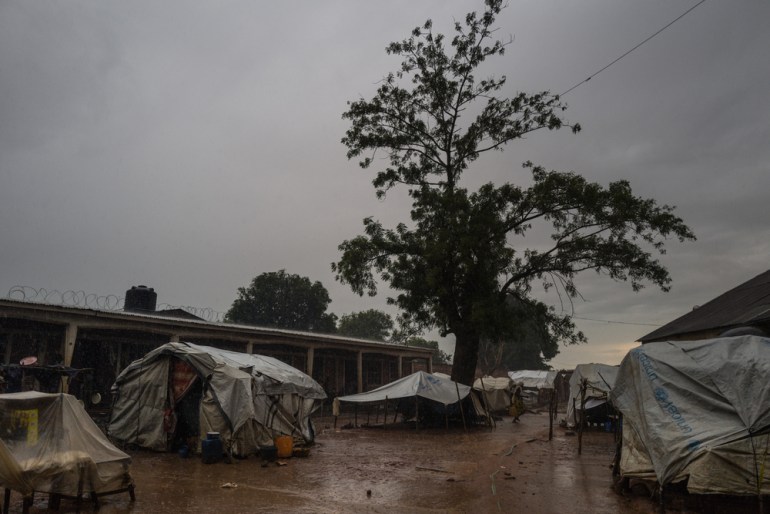 During the rainy season the displaced people living in the compound of the central mosque in Bambari cannot sleep, as they only have mats in the floor. The women cannot even cook because the firewood gets wet. [Lys Arango/MSF]
During the rainy season the displaced people living in the compound of the central mosque in Bambari cannot sleep, as they only have mats in the floor. The women cannot even cook because the firewood gets wet. [Lys Arango/MSF]

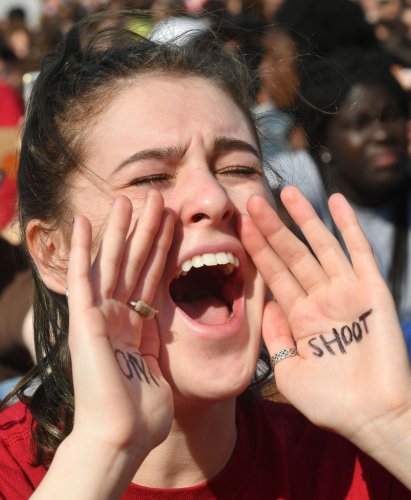









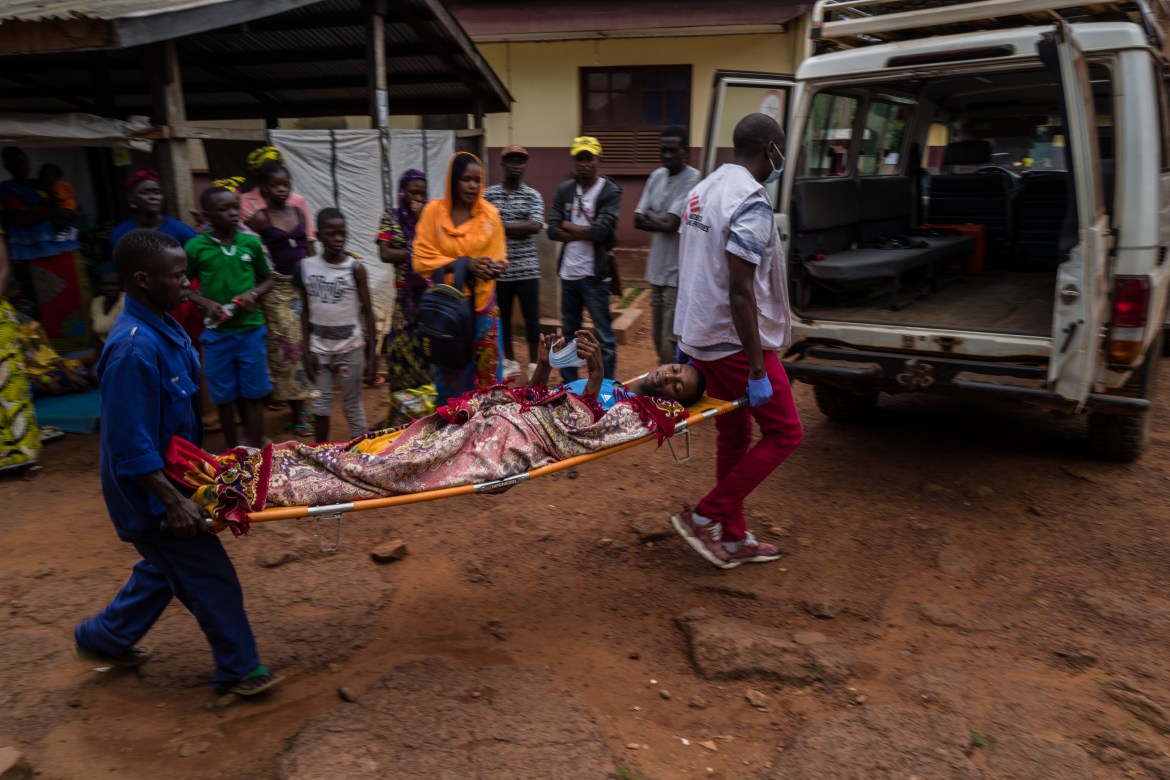

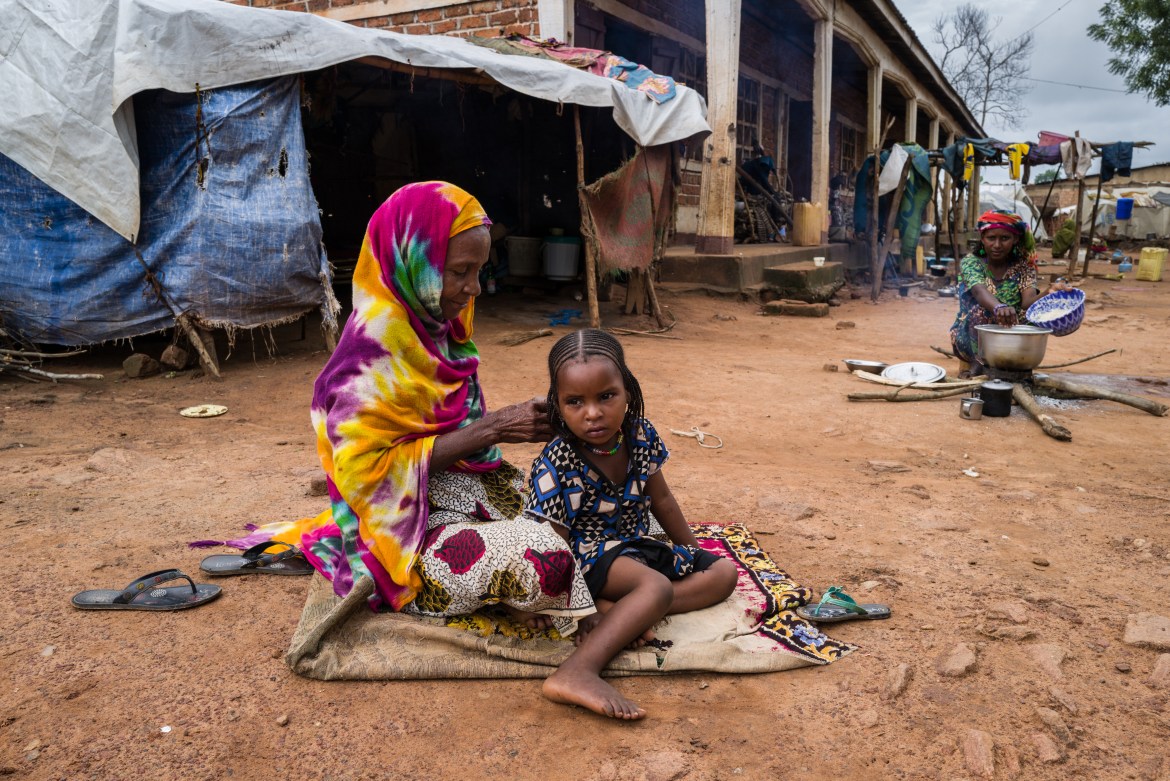
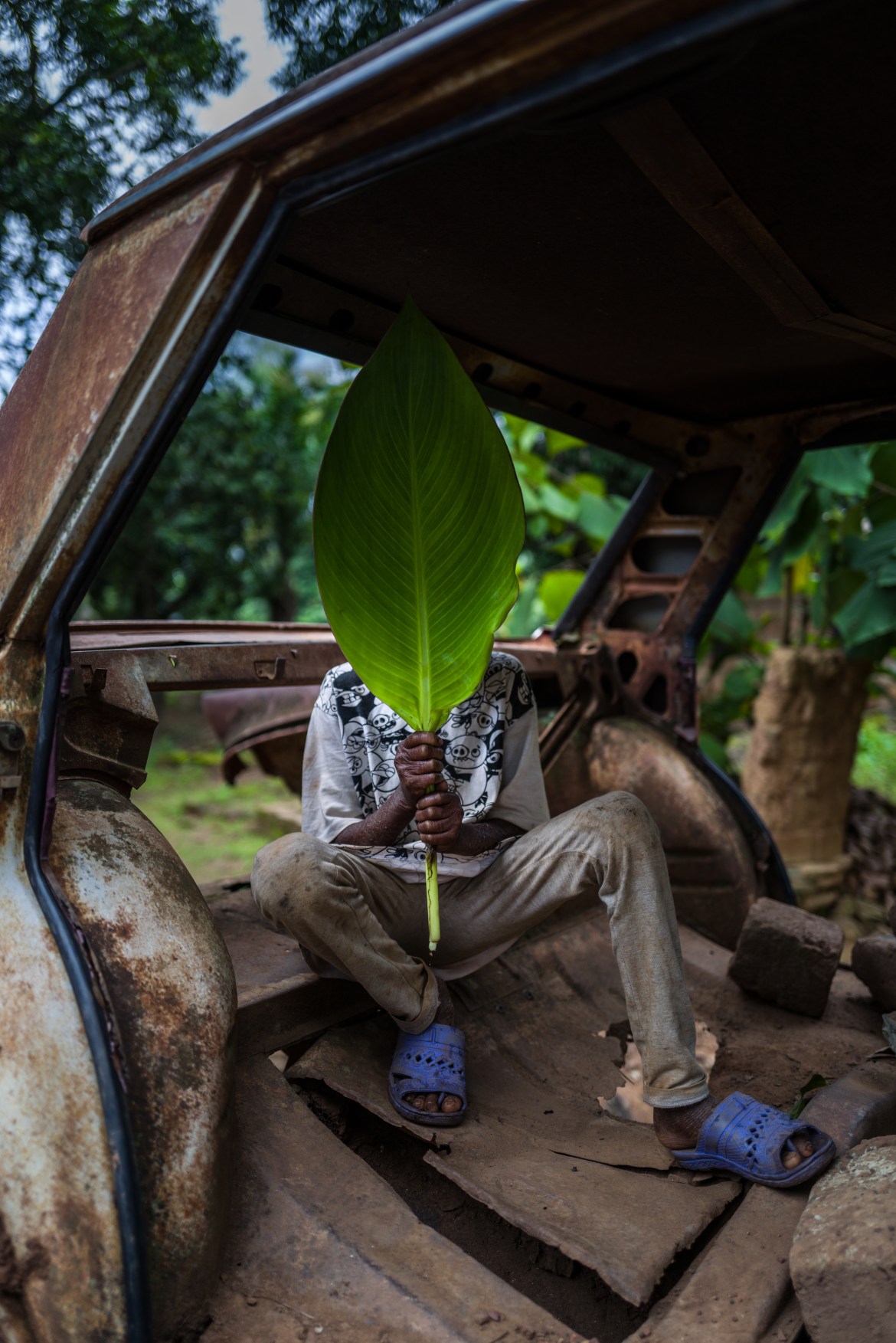




 During the rainy season the displaced people living in the compound of the central mosque in Bambari cannot sleep, as they only have mats in the floor. The women cannot even cook because the firewood gets wet. [Lys Arango/MSF]
During the rainy season the displaced people living in the compound of the central mosque in Bambari cannot sleep, as they only have mats in the floor. The women cannot even cook because the firewood gets wet. [Lys Arango/MSF]
